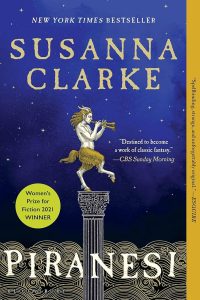Clarke’s work is fresh, inviting, and clever.
 The House is infinite. Its Halls contain thousands upon thousands of marble statues, each unique in their depictions and stories. Piranesi knows these walls well. He has charted the Tides, explored many of the Halls, and found some of his favorite statues. He dreams to one day explore the House in its entirety, a daunting but exciting task. There is only one other human in the House, named the Other, who appears twice a week. In their visits, the Other enlists Piranesi to help him find the Great and Secret Knowledge of the House. Piranesi’s aptitude for exploration makes him perfect for finding what the Other seeks. But as Piranesi finds new places in the House, he also discovers secrets, evidence of another person, and the hidden foundational truth the House is built on.
The House is infinite. Its Halls contain thousands upon thousands of marble statues, each unique in their depictions and stories. Piranesi knows these walls well. He has charted the Tides, explored many of the Halls, and found some of his favorite statues. He dreams to one day explore the House in its entirety, a daunting but exciting task. There is only one other human in the House, named the Other, who appears twice a week. In their visits, the Other enlists Piranesi to help him find the Great and Secret Knowledge of the House. Piranesi’s aptitude for exploration makes him perfect for finding what the Other seeks. But as Piranesi finds new places in the House, he also discovers secrets, evidence of another person, and the hidden foundational truth the House is built on.Narrated through the titular character’s journal entries, Piranesi, published in 2020, won the 2021 Women’s Prize for Fiction and is Susanna Clarke’s second novel following her debut in 2004. Clarke’s work is fresh, inviting, and clever. She withholds just enough information throughout to keep the pages turning while tying the narrative together beautifully. Clarke stretches the bounds of what a biased narrator is capable of through Piranesi. He is eager and honest, but also naive, and he doesn’t fully understand the information he comes into contact with. His limitations as a biased narrator add tension to the novel as readers make connections faster than Piranesi can.
Much of the novel is a quiet reflection as Piranesi explores the House and what he loves and remembers. Piranesi is a unique narrator, and his distinct voice makes a stamp across the whole novel. Near the beginning, he describes to the reader his plans for fully exploring the House. He then says, “The enormity of this task sometimes makes me feel a little dizzy, but as a scientist and explorer I have a duty to bear witness to the Splendors of the World.” This mark of Piranesi’s determination and hint of optimism make him a narrator that readers root for throughout his endeavors. One of his first lines is, “the Beauty of the House is immeasurable, its Kindness infinite.” His appreciation for the House and life itself is consistent, and through his narration, readers gain a unique understanding of the House that can only come from his perspective. While his voice and situation are so different that his story may initially be difficult to delve into, his train of thought is simple enough that it becomes easy to follow.
Piranesi is a peculiar story that is brilliantly told. Although it is only Clarke’s second novel, the craftsmanship within showcases Clarke as a master of storytelling. With its unique narration, dramatic irony, and beautiful worldbuilding, Piranesi stands out on the shelf as a one-of-a-kind fantasy story.
—Review by Sydney Gant



